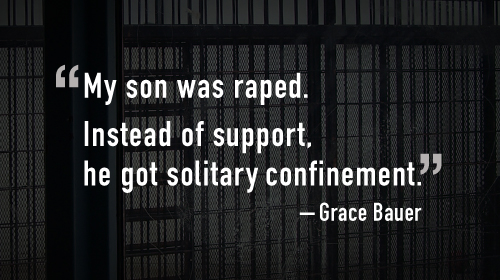
Imagine you have a 13-year-old son. And now imagine the worst that could happen to him. I'm a mother, and I've lived through it.
When my son Corey was 13, he was raped by another young prisoner. Cell guards stood by and watched, taking bets on which "kid would win." Corey lost the fight.
After something this horrific happens, kids should get support. Instead, Corey was placed in solitary confinement.
At the time, we actually felt relief when we heard he'd been placed in "protective custody," one of the many names juvenile facilities use for solitary confinement. In those early days we had no information on the damaging effects of solitary. We thought solitary would help to keep Corey safe from the rampant violence in the facility.
Instead, what we have seen since is that solitary hurt my son a great deal.
Once, Corey was an honor roll student who was well-liked by his teachers and peers. But after just a few short months in juvenile detention, he became fearful and anxious. The physical abuse left him with physical scars; but it is the emotional damage, caused by the extreme isolation and exposure to horrific violence at such a young age, that concerns me the most.
When he first came home, Corey was diagnosed with post-traumatic stress disorder and deep depression. He would strike out blindly in his waking moments out of fear of being assaulted. He cried out in his sleep and suffered from nightmares. Even our family's love and care could not erase the horror he experienced or heal his wounds.
After this first period behind bars, Corey has returned to juvenile facilities several other times. He has been locked alone in solitary in every facility he has ever been in, often for extended periods of time.
As a mother who witnessed the long-term impact of my son's time in solitary confinement, I know that children should never be locked alone. I feel deeply concerned that the federal Bureau of Prisons has refused to release any information about whether kids under its care are being subjected to solitary confinement for extended periods of time. There could be many more kids, suffering as my son did – we simply do not know. And if we do not know, we cannot help.
A couple months ago, my organization, Justice for Families, joined 40 other concerned groups and sent a letter to Attorney General Eric Holder asking him to ban solitary confinement for children in the custody of the federal government. Last month, Robert L. Listenbee, Administrator of the Department of Justice (DOJ) Office of Juvenile Justice and Delinquency Prevention (OJJDP) responded to our request. In his letter, Listenbee said that DOJ knows that "isolation of children is dangerous and inconsistent with best practices and that excessive isolation can constitute cruel and unusual punishment" and that DOJ "intend[s] to examine the status of Department efforts in this area."
I couldn't agree more that the solitary confinement of children is dangerous, wrong and violates basic human and constitutional rights. And I applaud OJJDP for its commitment to look into the issue. But this should just be the first step. Here's what needs to come next:
- The DOJ must tell the public about whether and how it uses solitary confinement on children.
- It must ban the practice for children in federal custody.
- It must use its power to encourage state and local facilities to do the same.
For my family, seeing the impact of solitary on my son has been devastating. Other families with kids behind bars in federal juvenile detention should have the guarantee that the U.S. government will never subject their children to solitary confinement.
TAKE ACTION: Tell Attorney General Eric Holder to ban the solitary confinement of youth in federal facilities.
Learn more about juvenile detention and other civil liberties issues: Sign up for breaking news alerts, follow us on Twitter, and like us on Facebook.
